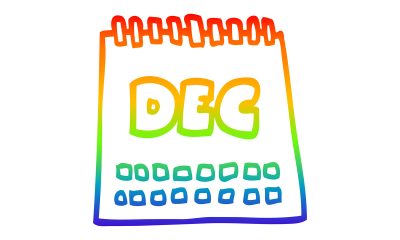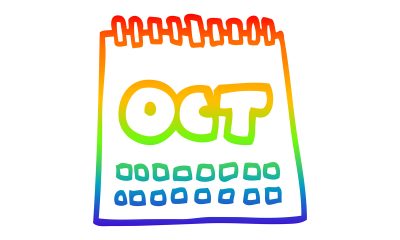District of Columbia
Recovery at the Triangle Club
Coming together as a group to fight a common addiction
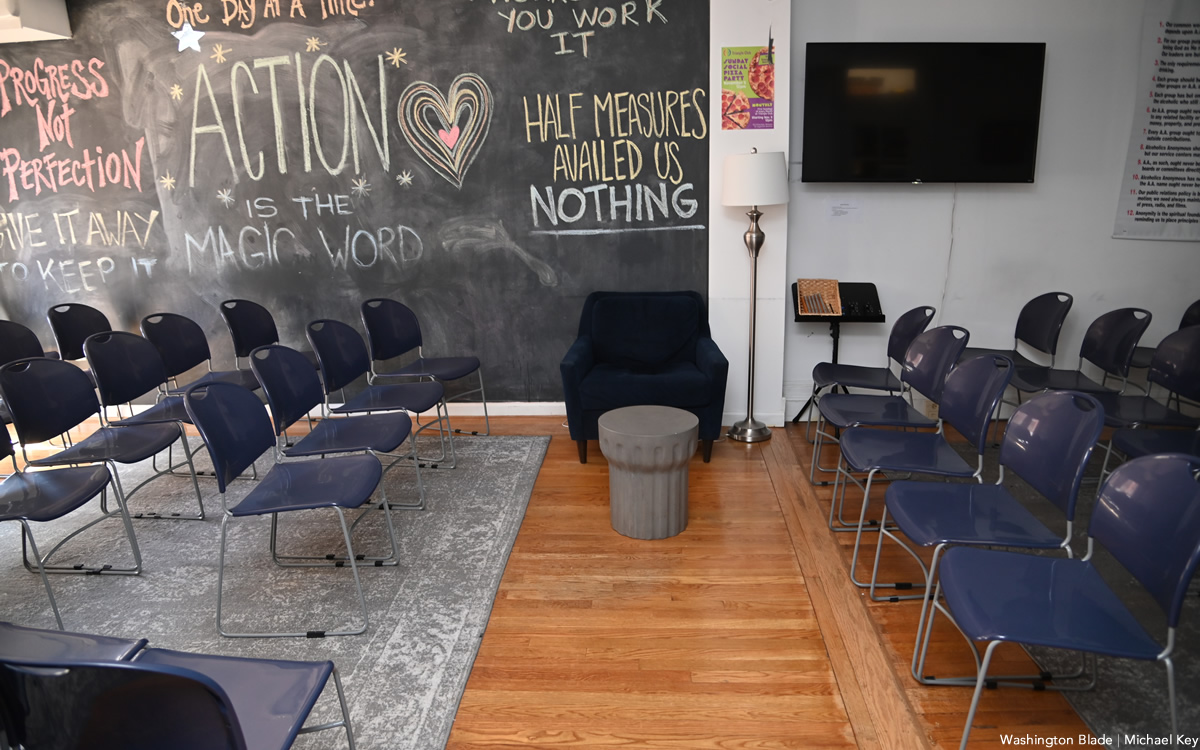
On Sunday, between the Dupont Italian Kitchen, where the tables are filled with the boozy brunches of the kickball gays, and Mikko, where a young couple is celebrating their anniversary with some Champagne, the door to a row-house opens, and all at once, a crowd pours forth onto the stairs. Only the stairs keep on filling. These folks aren’t leaving. They’ve only left the building to come to the stairs, just to chat. It’s as though 100 people all decided to go for a smoke out front, all at the same time. But if you ask them why they’re there, you’ll get only the vaguest of answers. “We’re just coming from a meeting,” one will say. “It’s a clubhouse,” says another.
There are good reasons for this vagueness. The Triangle Club is a center for queer folk to attend recovery meetings: Overeaters Anonymous, Alcoholics Anonymous, Crystal Meth Anonymous, Sexual Compulsives Anonymous. It’s part of the very mission of these groups to protect the privacy of their members. But these groups also want those in the queer community who need the support to know that they’re there. And so the folks at the Triangle Club were kind enough to welcome the Blade into their space for a few meetings, to see how things worked and shed some light on what they’re all about.
The Club had its kickoff meeting in 1988, during the AIDS crisis. Churches weren’t particularly enthusiastic about hosting gay recovery meetings in their back rooms. And so the Club sought to provide a safe place for those meetings to take place. At the time of the club’s founding, it was estimated that gays and lesbians were twice as likely to report problems with alcohol abuse than heterosexuals. One would hope that things might have changed in the intervening years. But according to a government report released this summer, that figure has barely improved. (The government report did not collect any statistics on transgender people.)
Of course there is no single reason queer people develop problems with drugs and alcohol. But one in particular struck me, especially as a reason I heard coming from a lot of the younger folk at the Triangle Club. “I thought meth was a prerequisite for going out,” said one. “I thought that’s what you did.” Another said, “I drank to find community. And then I drank to numb myself when I didn’t find it in the gay community.” Again and again, I heard stories about turning to drugs and alcohol as a way of finding connection, and as a way of coping with the failure to find connection.
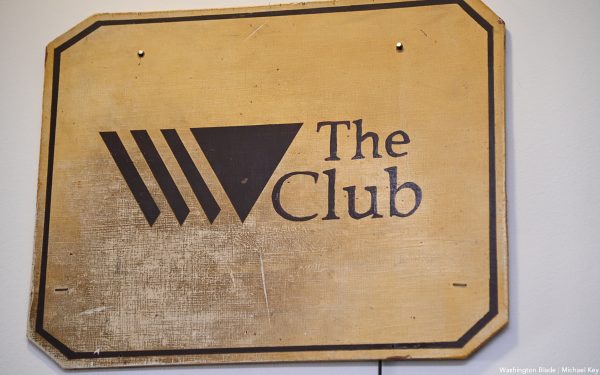
And so while I heard a lot of gratitude for the role the meetings at the Triangle Club played in people’s recovery, I also heard a lot of gratitude for the community of the Triangle Club itself. It wasn’t just that the Club helped people turn away from an unhealthy way of solving their problems. It’s that it gave them what they were really looking for in the first place: a community they could call their own.
Improbably, as I left a meeting of Crystal Meth Anonymous, I found myself wishing to be an addict in recovery. To have a place to share things that would go unsaid among friends and family, let alone therapists. To take part, week after week, in one another’s mission for a more fulfilling life. To be present for the absolute raucousness, as when one gentleman described living on meth as “wearing a fur coat into a swimming pool,” and then “turning the wave-machine on.” To hear the applause that only someone four days sober could receive. But what kind of destructive, life-threatening wish was I making? I couldn’t possibly be serious.
Many of us in the queer community are exhausted by drinking, if not drugging, our way into it. That exhaustion might not rise to the level of addiction, but this has the perverse consequence of not driving us to seek alternative forms of belonging. One of the men I interviewed kept talking of the “sober community,” and my ears perked up. Perhaps there was a broader community of folks, of which those in recovery were only a part, that wasn’t centered around substance use.
“The sober community absolutely extends beyond the Triangle Club,” he told me. “There are a bunch of other gay meetings that go on.” This wasn’t exactly what I hoped to hear. What a sorry state we’re in, I couldn’t help but feel that to be part of the sober community was to be in recovery. As though the community of substance use were so mandatory that it had to drive you to your own personal edge in order for you to find community in sobriety.
The Triangle Club should not be overly romanticized, and they’d be the first to tell you. People talked of trying to find fellowship at the club in the past, and not necessarily succeeding. Being one of two Black people in the room, only for the other to drop out of the program. Or of the demands of service, dragging yourself out late Friday night to chair a meeting, or sponsoring someone for the first time and being scared that you aren’t the right one to advise them. But I think it’s a testament to the space that these things could be said in the space. The meetings aren’t a place of mandatory optimism, but honest experience. And what good is a meeting for sharing honest experience if you can’t share your negative experiences too?
I had hoped, as part of this feature, to attend a meeting of Sexual Compulsives Anonymous. The two meetings I appealed to were kind enough to hold a vote on whether they would open their doors—but in the end they opted to remain private. One gentleman from the meetings volunteered to share a little of what these meetings were all about. Recovery meetings in general depend on coming together as a group to fight a common addiction. But “S” meetings, as the gentleman described them, can’t take “coming together” lightly, nor a “common addiction” lightly.
To begin with, sexual addiction is not as straightforwardly defined as addiction to drugs or alcohol. What sobriety is for one person is not what sobriety is for another. One person might be trying to curtail a masturbation habit. But for others? “That simply isn’t an option,” the gentleman said. And unlike recovery meetings for substances, which can ban substances from the room, the same can’t as easily be said for “S” meetings. We’re sexual beings, and so inevitably, to bring yourself into a room is to bring sexuality along with it. The recovery meetings at the Triangle Club usually end with the group joining hands to say the serenity prayer. But this can’t be a given at “S” meetings, where joining hands might be violating someone’s boundary.
With the pandemic waning, most recovery meetings have slowly started to transition away from video format back to in-person. But “S” meetings have been more reluctant to do so, and most have stuck with a hybrid format. One veteran of Al-Anon voiced his relief at coming back to the rooms. “You can’t hug a square!” I suspect that’s the very reason “S” meetings have been slow to return.
Part of my disappointment in not attending the “S” meetings was how central they seemed to be to a queer recovery organization. Substance abuse might disproportionately affect the queer community, but it is the addicts who are queer, not the addictions. If the addiction is to love or sex, however, the addiction itself is inextricably queer. Aren’t the “S” meetings the heart, in a sense, of the Triangle Club? But a conversation with a gentleman from Alcoholics Anonymous had me rethinking this. “[Accepting you’re an alcoholic,] it’s similar to coming out as gay,” he said. “There are people out there who view it as a moral failing, but it’s just part of who I am.”
The experience of coming out is so central to being queer. How could coming out as an addict have nothing whatsoever to do with it? The same story of a newfound, authentic life was as common to the folks at the Triangle Club as it would be to anyone who comes out as queer.
(CJ Higgins is a postdoctoral fellow with the Alexander Grass Humanities Institute at Johns Hopkins University.)
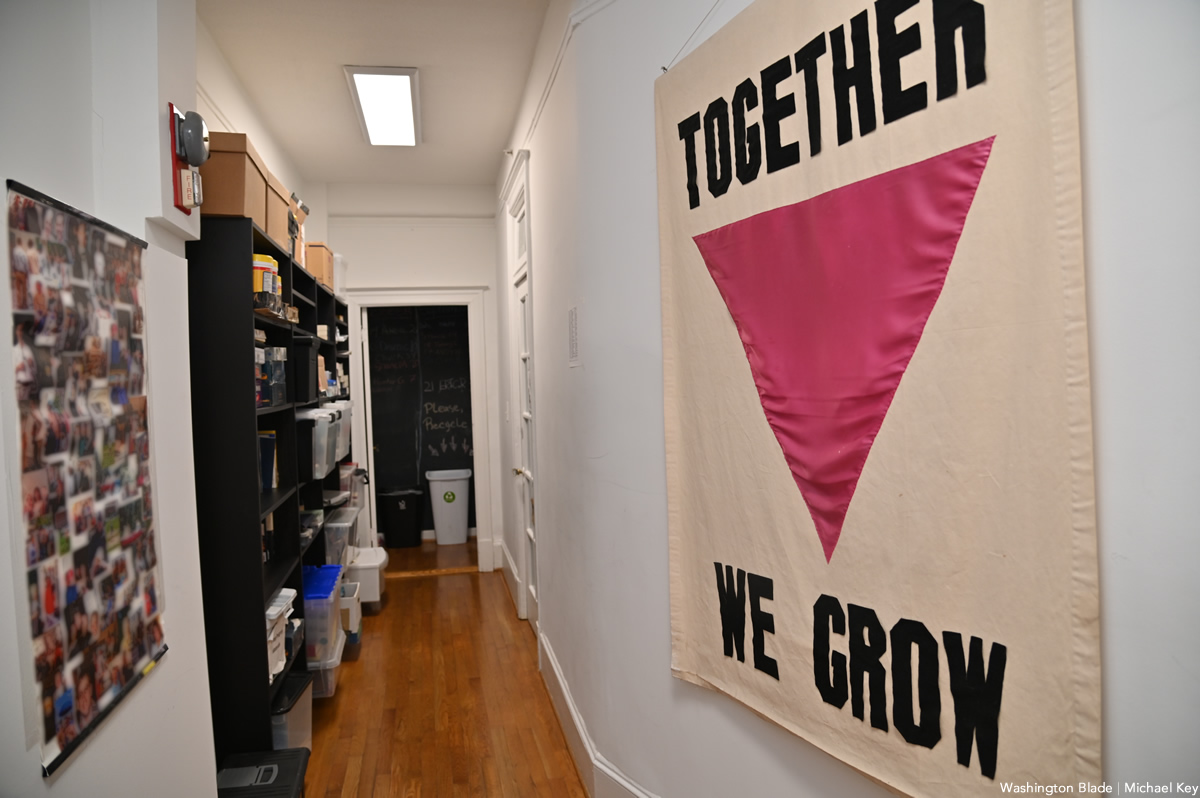
District of Columbia
D.C. Black Pride theme, performers announced at ‘Speakeasy’
Durand Bernarr to headline 2026 programming

The Center for Black Equity held its 2026 DC Black Pride Theme Reveal event at Union Stage on Monday. The evening, a “Speakeasy Happy Hour,” was hosted by Anthony Oakes and featured performances by Lolita Leopard and Keith Angelo. The Center for Black Equity organizes DC Black Pride.
Kenya Hutton, Center for Black Equity president and CEO, spoke following the performances by Leopard and Angelo. Hutton announced this year’s theme for DC Black Pride: “New Black Renaissance.”
Performers for 2026 DC Black Pride were announced to be Bang Garcon, Be Steadwell, Jay Columbus, Bennu Byrd, Rue Pratt and Akeem Woods.
Singer-songwriter Durand Bernarr was announced as the headliner for the 2026 festivities. Bernerr gave brief remarks through a video played on the screen at the stage.
DC Black Pride is scheduled for May 22-25. For more information on DC Black Pride, visit dcblackpride.org.

In an official statement released at the reveal event Capital Pride Alliance described its just announced 2026 Pride theme of “Exist, Resist, Have the Audacity” as a “bold declaration affirming the presence, resilience, and courage of LGBTQ+ people around the world.”
The statement adds, “Grounded in the undeniable truth that our existence is not up for debate, this year’s theme calls on the community to live loudly and proudly, stand firm against injustice and erasure, and embody the collective strength that has always defined the LGBTQ+ community.”
In a reference to the impact of the hostile political climate, the statement says, “In a time when LGBTQ+ rights and history continue to face challenges, especially in our Nation’s Capital, where policy and public discourse shape the future of our country, together, we must ensure that our voices are visible, heard, and unapologetically centered.”
The statement also quotes Capital Pride Alliance CEO and President Ryan Bos’s message at the Reveal event: “This year’s theme is both a declaration and a demand,” Bos said. “Exist, Resist, Have Audacity! reflects the resilience of our community and our responsibility to protect the progress we’ve made. As we look toward our nation’s 250th anniversary, we affirm that LGBTQ+ people have always been and always will be part of the United States’s history, and we will continue shaping its future with strength and resolve,” he concluded.
District of Columbia
Capital Pride board member resigns, alleges failure to address ‘sexual misconduct’
In startling letter, Taylor Chandler says board’s inaction protected ‘sexual predator’

Taylor Lianne Chandler, a member of the Capital Pride Alliance Board of Directors since 2019 who most recently served as the board’s secretary, submitted a letter of resignation on Feb. 24 that alleges the board has failed to address instances of “sexual misconduct” within the Capital Pride organization.
The Washington Blade received a copy of Chandler’s resignation letter one day after she submitted it from an anonymous source. Chandler, who identifies as transgender and intersex, said in an interview that she did not send the letter to the Blade, but she suspected someone associated with Capital Pride, which organizes D.C.’s annual LGBTQ Pride events, “wants it out in the open.”
“It is with a heavy heart, but with absolute clarity, that I submit my resignation from the Capital Pride Alliance Board of Directors effective immediately,” Chandler states in her letter. “I have devoted nearly ten years of my life to this organization,” she wrote, pointing to her initial involvement as a volunteer and later as a producer of events as chair of the organization’s Transgender, Gender Non-Conforming, and Intersex Committee.
“Capital Pride once meant something profound to me – a space of safety, visibility, and community for people who have often been denied all three,” her letter continues. “That is no longer the organization I am part of today.”
“I, along with other board members, brought forward credible concerns regarding sexual misconduct – a pattern of behavior spanning years – to the attention of this board,” Chandler states in the letter. “What followed was not accountability. What followed was retaliation. Rather than addressing the substance of what was reported, officers and fellow board members chose to chastise those of us who came forward.”
The letter adds, “This board has made its priorities clear through its actions: protecting a sexual predator matters more than protecting the people who had the courage to come forward. … I have been targeted, bullied, and made to feel like an outsider for doing what any person of integrity would do – telling the truth.”
In response to a request from the Blade for comment, Anna Jinkerson, who serves as chair of the Capital Pride board, sent the Blade a statement praising Taylor Chandler’s efforts as a Capital Pride volunteer and board member but did not specifically address the issue of alleged sexual misconduct.
“We’re also aware that her resignation letter has been shared with the media and has listed concerns,” Jinkerson said in her statement. “When concerns are brought to CPA, we act quickly and appropriately to address them,” she said.
“As we continue to grow our organization, we’re proactively strengthening the policies and procedures that shape our systems, our infrastructure, and the support we provide to our team and partners,” Jinkerson said in her statement. “We’re doing this because the community’s experience with CPA must always be safe, affirming, empowering, and inclusive,” she added.
In an interview with the Blade, Chandler said she was not the target of the alleged sexual harassment.
She said a Capital Pride investigation identified one individual implicated in a “pattern” of sexual harassment related behavior over a period of time. But she said she was bound by a Non-Disclosure Agreement (NDA) that applies to all board members and she cannot disclose the name of the person implicated in alleged sexual misconduct or those who came forward to complain about it.
“It was one individual, but there was a pattern and a history,” Chandler said, noting that was the extent of what she can disclose.
“And I’ll say this,” she added. “In my opinion, with gay culture sometimes the touchy feely-ness that goes on seems to be like just part of the culture, not necessarily the same as a sexual assault or whatever. But at the same time, if someone does not want those advances and they’re saying no and trying to push you away and trying to avoid you, then it makes it that way regardless of the culture.”
When asked about when the allegations of sexual harassment first surfaced, Chandler said, “In the past year is when the allegation came forward from one individual. But in the course of this all happening, other individuals came forward and talked about instances – several which showed a pattern.”
Chandler’s resignation comes about five months after Capital Pride Alliance announced in a statement released in October 2025 that its then board president, Ashley Smith, resigned from his position on Oct. 18 after Capital Pride became aware of a “claim” regarding Smith. The statement said the group retained an independent firm to investigate the matter, but it released no further details since that time. Smith has declined to comment on the matter.
When asked by the Blade if the Smith resignation could be linked in some way to allegations of sexual misconduct, Chandler said, “I can’t make a comment one way or the other on that.”
Chandler’s resignation and allegations come after Capital Pride Alliance has been credited with playing the lead role in organizing the World Pride celebration hosted by D.C. in which dozens of LGBTQ-related Pride events were held from May through June of 2025.
The letter of resignation also came just days before Capital Pride Alliance’s annual “Reveal” event scheduled for Feb. 26 at the Hamilton Hotel in which the theme for D.C.’s June 2026 LGBTQ Pride events was to be announced along with other Pride plans.
-

 India5 days ago
India5 days agoActivists push for better counting of transgender Indians in 2026 Census
-

 Advice5 days ago
Advice5 days agoDry January has isolated me from my friends
-

 District of Columbia5 days ago
District of Columbia5 days agoCapital Pride reveals 2026 theme
-

 National4 days ago
National4 days agoAfter layoffs at Advocate, parent company acquires ‘Them’ from Conde Nast

